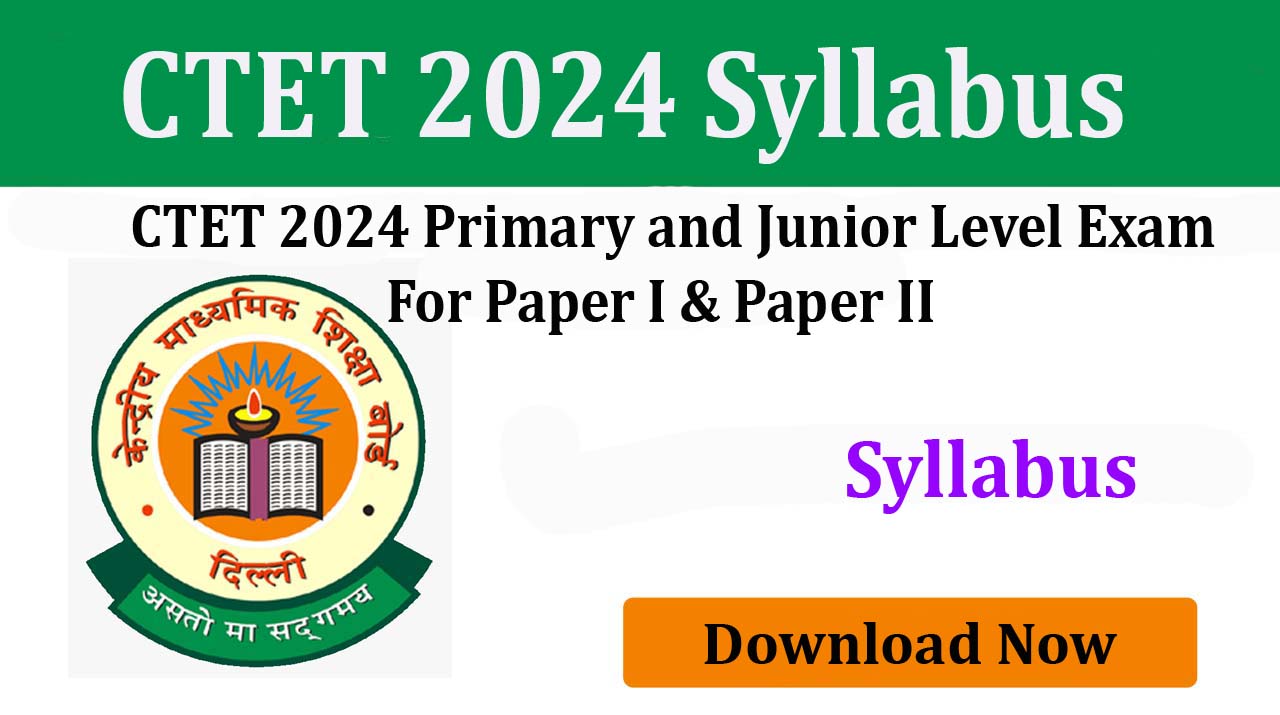Central Teacher Eligibility CTET Test 2024 Syllabus
CTET 2024: Structure and Content of Syllabus
The CTET 2024 syllabus assesses candidates for teaching roles in primary (I-V) and elementary (VI-VIII) levels. It covers child development, pedagogy, language skills, and subject-specific knowledge like mathematics, science, and social studies. The syllabus focuses on understanding child psychology, teaching methods, and subject expertise to ensure effective classroom teaching.
Paper I (Primary Stage for Classes 1 to V)
I. Child Development and Pedagogy (30 Questions)
-
Child Development (15 Questions)
- Development and learning relationship
- Principles of child development
- Influence of heredity and environment
- Socialization (role of teachers, parents, peers)
- Perspectives from Piaget, Kohlberg, and Vygotsky
- Child-centered education and critical thinking
- Intelligence and multidimensional approaches
- Language and thought development
- Gender as a social construct
- Individual differences (language, caste, community, religion)
- Assessment for learning vs. of learning
- School-Based Assessment and Continuous & Comprehensive Evaluation (CCE)
- Questioning techniques for critical thinking
-
Inclusive Education and Special Needs (5 Questions)
- Addressing diversity in classrooms
- Learning difficulties and impairments
- Talented and creative learners
-
Learning and Pedagogy (10 Questions)
- How children think, learn, and fail
- Social context of learning
- Child as a problem-solver and investigator
- Errors as steps in learning
- Cognition, emotions, motivation
- Factors affecting learning
II. Mathematics (30 Questions)
-
Content (15 Questions)
- Geometry, shapes, solids
- Number operations (addition, subtraction, multiplication, division)
- Measurement (weight, time, volume)
- Data handling, patterns, and money
-
Pedagogy (15 Questions)
- Understanding children’s thinking in math
- Place of mathematics in curriculum
- Language and community in math learning
- Evaluation and remedial teaching
III. Environmental Studies (30 Questions)
-
Content (15 Questions)
- Family, friends, animals, plants
- Food, shelter, water, travel, things we make
-
Pedagogy (15 Questions)
- EVS scope and integration
- Approaches and activities in EVS teaching
- Continuous and Comprehensive Evaluation (CCE)
IV. Language I (30 Questions)
V. Language II (30 Questions)
Paper II (Elementary Stage for Classes VI to VIII)
I. Child Development and Pedagogy (30 Questions)
-
Child Development (15 Questions)
- Learning relationship with child development
- Influence of environment and socialization
- Theories of Piaget, Kohlberg, Vygotsky
- Intelligence and child-centered education
- Gender and diversity in education
- Assessment methods
-
Inclusive Education (5 Questions)
- Learners from diverse backgrounds
- Specially abled and talented learners
-
Learning and Pedagogy (10 Questions)
- Cognitive development and learning strategies
- Emotions and motivation in learning
- Personal and environmental learning factors
II. Mathematics and Science (60 Questions)
III. Social Studies/Social Sciences (60 Questions)
-
Content (40 Questions)
- History
- Early societies, empires, revolutions, nationalist movements
- Geography
- Earth, natural resources, environment
- Social and Political Life
- Diversity, government, democracy, justice
-
Pedagogy (20 Questions)
- Critical thinking, evidence-based inquiry
- Project work, evaluation techniques
IV. Language I (30 Questions)
V. Language II (30 Questions)
Note :- Base On July CTET 2024

